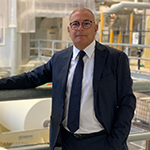Main Features of the project
CO2 Emissions saved (tCO2/year) à 3.000
Investment à about 7,5Meuro
Partnerships à EnelX, IEIS
The integrated factories that produce paper and transform it into sanitary products are not only energy intensive but also “space intensive”: the process areas and warehouses for storing the reels and the finished product are important.
Historically, the design of buildings did not envisage the use of roof surfaces for the installation of photovoltaic panels.
We have modified this design approach for the new buildings, and we have analysed the current surfaces available to install the panels, the project was carried out in the Borgo a Mozzano (LU) and Avigliano (PZ) factories and included the modification of many roofs which were adequate to allow the installation of photovoltaic panels.
The production of Tissue paper, even when it is supported by cogeneration (dimensioned on thermal needs) is a process unbalanced on electrical needs.
Collecting the solar energy available in the perimeter of the plant or nearby and using it in the process allows to reduce the amount of energy supplied by the grid, also contributing to a reduction of the loads and losses of the grid itself.
In the Borgo a Mozzano plant, photovoltaic panels were installed in 2022 for a capacity of 2.5MWp, and activation of a further 1.5MWp is expected by the end of spring 2023.
In the Avigliano plant, in addition to the present plant of approximately 1.0MWp, a new 2.0MWp plant will be started up in spring 2023.
About 97% of the plants’ energy production will be used for self-consumption.
The activity of installing photovoltaic panels on the available surfaces is simple but applied to a Tissue factory contains important development design principles: favoring integrated plants (paper mills + converting), designing the surfaces of the buildings to house the photovoltaic systems, create a balance between electrical and thermal needs capable of self-consuming the self-produced energy on the site.

Massimo Pasquini – CEO Lucart S.p.A.
Lucart is strongly determined to decarbonise its production activities, in compliance with the Paris agreements and the 2030 agenda.
The project is part of a broader plan drawn up by Lucart to reduce the climate changing emissions related to energy consumption, which includes, in addition to the installation of solar generation plants at its factories in Europe, installing biomass power plants for the production of electrical and thermal energy, reducing electricity consumption by the technological renovation of its production systems, purchasing of renewable energy through PPA and increasing the production capacity of recycled paper.
Main Features of the project
CO2 Emissions saved (tCO2/year) à 3.000
Investment à about 7,5Meuro
Partnerships à EnelX, IEIS